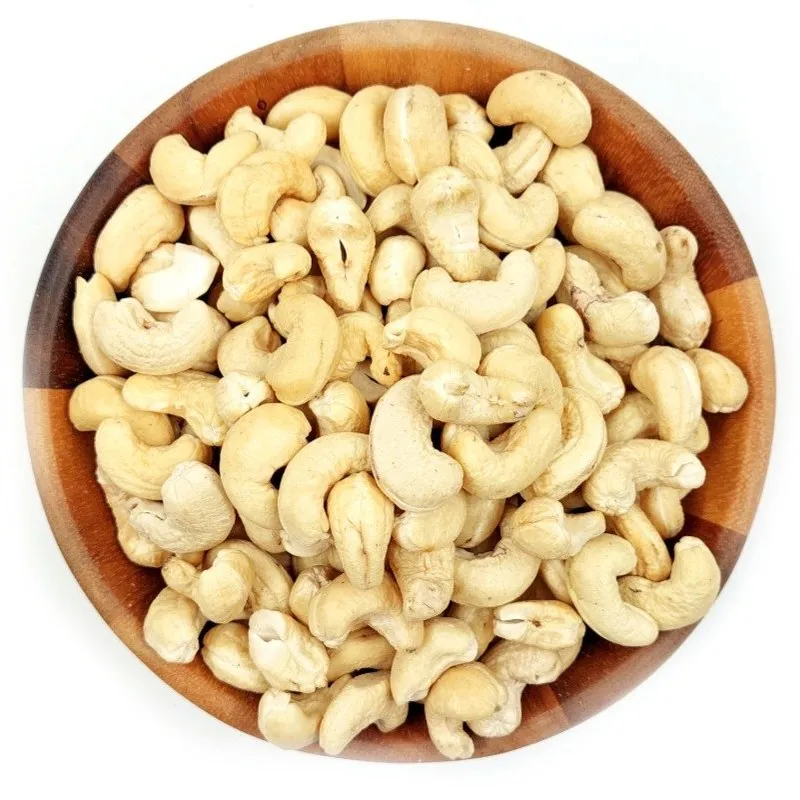Cashews are well-known for their delicious and nutritious nuts. However, often overshadowed by these popular nuts is the cashew apple, an often overlooked and underutilized fruit. Despite being called an apple, the cashew apple is actually a pseudo-fruit that grows on the cashew tree. This article aims to shed light on the edible potential of cashew apples and highlight their nutritional value, culinary uses, and potential health benefits.
1. Cashew Apple Description and Nutritional Profile:
The cashew apple is a fleshy accessory fruit that grows at the base of the cashew nut. It is shaped like an inverted bell, with a vibrant yellow, red, or orange color. Typically, it is larger than a tennis ball, and its size and shape significantly vary. The cashew apple has a refreshing and tangy taste, often described as a blend of mango, pineapple, and citrus fruits.
Regarding its nutritional profile, the cashew apple is low in calories, high in fiber, and packed with essential vitamins and minerals. It is a good source of vitamin C, which strengthens the immune system, promotes wound healing, and acts as an antioxidant. The fruit also contains B vitamins, potassium, iron, and magnesium, contributing to overall health and well-being.
2. Culinary Uses and Versatility:
While cashews may take center stage, the cashew apple can be equally versatile in the culinary world. Its vibrant flavor makes it a great addition to both sweet and savory dishes. In tropical regions like Brazil, where cashew apples are abundant, they are widely used to prepare juices, smoothies, and cocktails. The exotic taste of cashew apple juice is renowned for its quenching and revitalizing properties.
Moreover, cashew apples can be transformed into jams, jellies, and preserves. The tangy and aromatic pulp can be cooked down with sugar to create a delightful spread that can be enjoyed on toast or used as a topping for desserts. The versatility of cashew apples also extends to sauces, salads, salsa, and chutneys, adding a unique tropical twist to a variety of dishes.
3. Health Benefits of Cashew Apples:
In addition to their delectable taste, cashew apples possess numerous health benefits. Some of these benefits include:

a. Boosting Immunity: Cashew apples are rich in vitamin C, which plays a key role in strengthening the immune system. Regular consumption can help protect the body against common illnesses and infections.
b. Promoting Digestive Health: With a high fiber content, cashew apples aid in maintaining a healthy digestive system. They can help prevent constipation, regulate bowel movements, and reduce the risk of gastrointestinal diseases.
c. Supporting Heart Health: Cashew apples contain heart-friendly nutrients such as potassium and magnesium, which help maintain normal blood pressure levels and minimize the risk of cardiovascular diseases.
d. Antioxidant Properties: Cashew apples offer natural antioxidants, such as vitamin C and phenolic compounds, which help combat free radicals and reduce oxidative stress in the body.
4. Sustainability and Economic Implications:
Apart from being nutritious and versatile, cashew apples also hold great potential in terms of sustainability and economic benefits. The fruit is often considered a byproduct of cashew nut production, and its utilization can help reduce waste in the agricultural industry.
In countries where cashew apple production is on a large scale, efforts are being made to explore its commercial potential. By developing various value-added products and promoting cashew apple cultivation, these regions can benefit from an additional income source while contributing to sustainable agriculture.
Conclusion:
The cashew apple, often overshadowed by its nut counterpart, is a fruit with immense culinary and nutritional potential. Its versatility in the kitchen, combined with its high nutritional value and numerous health benefits, make it an excellent addition to any diet. Moreover, the sustainable aspects and economic implications associated with the cashew apple make it an appealing commodity for both consumers and producers alike. So, next time you bite into a juicy cashew nut, do not forget about the bountiful cashew apple that accompanies it.Alternative Uses of Cashew Apples: Exploring the Business Opportunities
1. Cashew Apple Processing Industry:

The cashew apple processing industry has the potential for significant growth. By harnessing the nutritional benefits and unique taste of cashew apples, entrepreneurs can establish businesses that focus on producing various value-added products. This can include cashew apple juice, jams, jellies, chutneys, and even beauty products like moisturizers and face masks.
Investing in the cashew apple processing industry can not only create new market opportunities but also help generate employment in rural areas where cashew apples are abundant. Additionally, it promotes sustainability by reducing waste and, in turn, contributing to a circular economy.
2. Export Potential:
Cashew apples have the potential to be a valuable export commodity for countries with abundant cashew production. By capitalizing on the fruit’s unique taste and nutritional value, exporters can tap into international markets, particularly those with a demand for exotic fruits and beverages.
A key aspect of leveraging the export potential is to ensure the quality and freshness of the cashew apples during transportation. The use of appropriate packaging and refrigeration techniques can help maintain the fruit’s flavor and integrity, making it an attractive and sought-after product in foreign markets.
3. Agro-tourism and Farm Visits:
Cashew apple plantations can offer a unique agro-tourism experience to visitors. This can involve guided tours through the orchards, showcasing the cultivation and harvesting processes. Additionally, farmers can organize workshops or cooking classes, allowing visitors to learn about the culinary uses of cashew apples and create their own products.
Agro-tourism not only provides additional income for farmers but also promotes cultural exchange and educates visitors about the importance of sustainable agriculture. It can also contribute to rural development, as visitors support local businesses by purchasing fresh cashew apples and other agricultural products.
4. Functional Food and Nutraceutical Industry:
The growing demand for functional foods and nutraceuticals opens up opportunities for incorporating cashew apple extracts into supplements and health products. The presence of antioxidants, vitamins, and minerals in cashew apples makes them an excellent candidate for such applications.

Entrepreneurs can tap into this emerging market by partnering with researchers and scientists to develop innovative products that target specific health benefits. This can include dietary supplements, energy bars, herbal teas, and even cosmetic products that utilize the beneficial properties of cashew apples.
5. Collaboration with Local Food Businesses:
Collaborating with local food businesses, such as restaurants, cafes, and bakeries, is another avenue for promoting cashew apples. This can involve creating partnerships to develop exclusive menu items or limited-time offerings that incorporate cashew apples, thereby introducing the fruit to a wider audience.
By highlighting the unique taste and nutritional benefits of cashew apples, food businesses can tap into the growing demand for healthy and exotic ingredients. This collaboration can lead to increased sales and brand recognition for both the cashew apple producers and the partnering establishments.
6. Research and Development for New Products:
Investing in research and development is crucial for exploring the full potential of cashew apples. Research institutions, universities, and private companies can collaborate to investigate innovative uses and applications for cashew apples in various industries.
This research can include discovering new methods for extending the shelf life of cashew apples, identifying novel phytochemicals present in the fruit, or developing new extraction techniques to preserve the nutritional integrity of the fruit in processed products.
7. Promoting Cashew Apple Farms and Plantations:
Another aspect of fostering the business potential of cashew apples is through promoting and supporting cashew apple farms and plantations. This can be done through government initiatives, agricultural campaigns, or educational programs that incentivize farmers to cultivate cashew apple trees.
By encouraging the cultivation of cashew apple trees, countries can diversify their agricultural sectors, improve rural incomes, and contribute to food security. Creating farmer cooperatives or associations can also help streamline the marketing and distribution of cashew apples, ensuring fair prices for farmers.

8. Supply Chain Management and Distribution:
Effective supply chain management is crucial for the success of any cashew apple business. Ensuring a smooth and efficient distribution network from the farms to processing units, retail outlets, and export markets is essential for maintaining the freshness and quality of the fruit.
Investment in cold storage facilities, refrigerated transportation, and proper packaging techniques can aid in maintaining the flavor and nutritional value of cashew apples throughout the supply chain. Additionally, a robust distribution system can help reach a wider consumer base and connect cashew apple producers with potential buyers.
9. Online Marketing and E-commerce:
In today’s digital age, creating a strong online presence and utilizing e-commerce platforms can significantly boost the visibility and sales of cashew apple products. Establishing a dedicated website or social media platforms can help showcase the unique attributes of cashew apples and engage with a global audience.
Partnering with online marketplaces and participating in food-related platforms can also provide exposure to a wider customer base. Implementing digital marketing strategies, such as search engine optimization and social media advertising, can further drive traffic and increase sales.
10. Collaboration with Research Institutions:
Collaborating with research institutions can help unlock the full potential of cashew apples, particularly in terms of discovering new applications, conducting clinical trials, and validating health claims. By partnering with scientific experts, entrepreneurs can enhance the credibility of their products and gain a competitive edge in the market.
Research institutions can also assist in providing technical support and guidance on quality control measures, ensuring that cashew apple products adhere to local regulations and international standards.
Conclusion:

The cashew apple, with its unique flavor, nutritional value, and myriad of potential uses, presents exciting business opportunities in various industries. From the processing industry to export markets, alternative uses of cashew apples can contribute to economic growth, promote sustainability, and support rural development. By harnessing the potential of this underutilized fruit, entrepreneurs and farmers can tap into new markets, create innovative products, and contribute to a healthier and more sustainable future.










